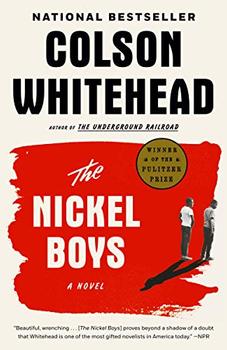Summary | Excerpt | Reading Guide | Reviews | Beyond the book | Read-Alikes | Genres & Themes | Author Bio

In his last novel, The Underground Railroad, Colson Whitehead sketched an alternate version of the Civil War, in which the titular network of safe houses and escape routes transporting runaway slaves to Canada was an actual subterranean railroad system. Through the lens of the fantastical, the work examines the horrors of slavery, and offers a fresh perspective on American history.
Jumping a century forward, the author's follow-up, The Nickel Boys, takes place at the height of the Civil Rights Movement in the 1960s, depicting an entrenched system of institutionalized racism that's nearly as brutal and dehumanizing as slavery itself. The story follows Elwood, an idealistic young man preparing to attend college when a tragic misunderstanding lands him in an inhumane reformatory school, the Nickel Academy. Bringing to life the horrors of Jim Crow, the novel considers the possibility of maintaining hope in the face of racist terror and violence.
The plot opens by sketching a vivid portrait of Elwood's life in Tallahassee, Florida, circa 1963. The teenager devotes all his energy to working at a convenience store, studying for his exams and preparing to be the first in his family to attend college. Raised in a home without a television and forbidden from listening to Motown, Elwood's favorite pastime is playing his album of Martin Luther King at Zion Hill, a collection of the activist's speeches and a Christmas gift from his grandmother Harriet. Strict but loving, Harriet has raised Elwood since his parents abandoned him at an early age, heading west to live unencumbered by childcare.
Comprising the first part of three, these chapters abound with references to the life-affirming activism of the Civil Rights Movement. Elwood loves reading Life photo essays about anti-racist protests, seeks out Black-owned newspapers like The Chicago Defender, and finds inspiration to better himself and fight for a just future in the bravery of the Freedom Riders. Extremely idealistic, he prides himself on being thought of as having an "industrious nature and steady character."
In neat, understated prose, Whitehead sensitively renders an era of political optimism. At the time the story starts, the Civil Rights Act of 1960 had recently established much-needed federal oversight of local voter registration polls, and more legislative victories seemed likely; the movement hadn't yet become disillusioned with white liberal politicians like JFK and LBJ. Elwood's community brims with hope, and the teen's faith in patience, industry and nonviolence reflect the time's dominant ethos.
Then, in the span of a few pages, everything falls apart. Caught in the wrong place at the wrong time, Elwood is accused of being an accomplice to theft by racist police officers. Whitehead smartly elides the protagonist's trial, leaving the details of his sentencing to the imagination, and the second and longest part of the novel begins with Elwood entering the Nickel Academy, a horrendous segregated reformatory school based on an infamous real-life institution (See Beyond the Book).
"I am stuck here, but I'll make the best of it," Elwood tells himself, "and I'll make it brief." The teen's faith that, if he follows the rules of the system, he'll be recognized as virtuous and released is soon challenged, though, both by the cynicism of his closest confidante at the academy, Turner, as well as the unrestrained violence and surveillance of Nickel's guards, teachers and administrators.
The crux of the plot hinges on whether or not Elwood can survive the academy with his idealism intact. In this, he acts as a symbol for the entirety of the Civil Rights Movement, which faced intensifying state repression during the mid-60s. Is nonviolence an effective response, Whitehead wonders, to a government that beats and bloodies unarmed protesters? Should Black people play by the rules of a racist system in their fight for better lives, or aim to topple it?
The debate about the merits of respectability politics and integrating into white society versus an ideology of Black liberation is as timely as ever, in an era when unabashed white supremacy is on the rise across the globe, and Whitehead's critique of assimilationist politics is sharp. Part of what makes the novel so memorable is the way the ending explicitly ties past injustice to the present, refusing to quarantine racism to the realm of history. So, too, does the author's quiet style refuse to sensationalize anti-Black violence, in contrast to other historical works of this kind.
Thoughtful and engaging, The Nickel Boys offers astute observations about the history of race relations in America: it's sure to appeal to the author's devoted readers as well as those new to his work.
![]() This review was originally published in The BookBrowse Review in July 2019, and has been updated for the
July 2020 edition.
Click here to go to this issue.
This review was originally published in The BookBrowse Review in July 2019, and has been updated for the
July 2020 edition.
Click here to go to this issue.

If you liked The Nickel Boys, try these:

The Heaven & Earth Grocery Store
by James McBride
Published 2025
From James McBride, author of the bestselling Oprah's Book Club pick Deacon King Kong and the National Book Award–winning The Good Lord Bird, a novel about small-town secrets and the people who keep them.

by Tananarive Due
Published 2024
A gripping, page-turning novel set in Jim Crow Florida that follows Robert Stephens Jr. as he's sent to a segregated reform school that is a chamber of terrors where he sees the horrors of racism and injustice, for the living, and the dead.
Your guide toexceptional books
BookBrowse seeks out and recommends the best in contemporary fiction and nonfiction—books that not only engage and entertain but also deepen our understanding of ourselves and the world around us.